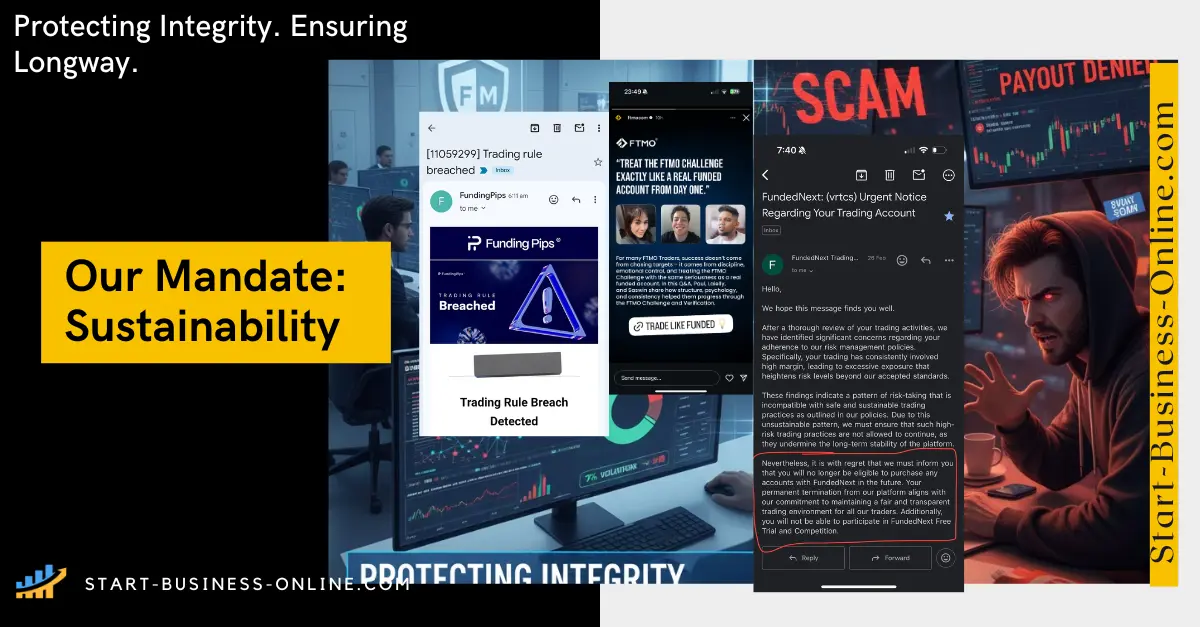Are you a futures trader looking to elevate your game? Then do look into the option of trading through a top futures prop firm, as such a move can equip you with the necessary tools and resources to thrive. Proprietary trading, often referred to as prop trading, has gained popularity as an investment approach, offering advantages to both traders and financial institutions. This methodology allows traders to leverage company capital when dealing with various financial instruments, while institutions can tap into market profits beyond client commissions, leading to a win-win outcome for both traders and prop firms.
Page Contents
- 1. What Does Futures Proprietary Trading Entail?
- 2. Is Futures Prop Trading Legally Compliant?
- 3. Selecting the Right Futures Prop Trading Firm
- 4. Prop firms offering Futures funding
- 5. Detangling Futures Trading with a Proprietary Trading Firm
- 6. Understanding the Risks in Futures Trading
- 7. Effective Risk Management in Futures Trading
- 8. The Various Types of Futures Contracts Explained
- 9. Crafting a Futures Trading Plan for Success
- 10. Concluding Thoughts on Selecting the Best Futures Proprietary Trading Firms
- 11. Futures Prop Trading Frequently Asked Questions (FAQs)
View more
What Does Futures Proprietary Trading Entail?
Futures proprietary trading, also known as futures prop trading, represents a mutually beneficial arrangement between trading companies and individual traders. Within this symbiotic partnership, trading firms provide traders with access to essential resources, including capital, cutting-edge technology, and specialized tools to facilitate futures market transactions.
In return, these trading companies receive a portion of the profits generated by these traders. This cooperative setup empowers traders to employ innovative strategies and tactics in the buying and selling of future contracts, with the goal of generating profits not only for themselves but also for the affiliated company.
Futures prop trading comes with numerous advantages for both traders and the trading firms themselves. For traders, joining a prop firm grants access to substantial capital that they may not possess independently, enabling them to take larger positions and potentially achieve higher returns. Furthermore, prop firms often supply advanced trading platforms and sophisticated analytical tools that empower traders to make well-informed decisions and execute trades with precision.
Collaborating with prop firms also offers traders a supportive and dynamic trading environment. They can tap into the wisdom of seasoned professionals and glean insights, strategies, and market knowledge. Prop firms typically cultivate a culture of ongoing learning, offering training programs, mentorship opportunities, and regular performance evaluations to help traders refine their skills and unlock their full potential.
For trading firms on the other hand, prop trading serves as a means to diversify their revenue streams and harness the expertise of talented traders. By partnering with skilled individuals, prop firms expand their trading capacity and gain access to a wider array of markets and strategies. The profit-sharing model incentivizes traders to excel, as their success directly contributes to the profitability of the prop trading firm.
Is Futures Prop Trading Legally Compliant?
Futures proprietary trading operates within the boundaries of the already established relevant legal frameworks, including the Volcker Rule, which was enacted as part of the Dodd-Frank Wall Street Reform and Consumer Protection Act. This rule emerged in response to the global financial crisis of 2008, with its namesake, former Federal Reserve chairman Paul Volcker, attributing the crisis to speculative investments made by investment banks.
In a nutshell, the Volcker Rule's primary objective is to prevent banks from engaging in certain forms of speculative transactions that do not directly benefit their depositors. Thus, it explicitly prohibits banks and bank-holding organizations from participating in proprietary trading, owning hedge funds, or engaging in private equity funds. The rule underscores that banks should prioritize customer satisfaction through market-making activities, which generate revenue via commissions. In contrast, proprietary trading centers on the bank's independent profit generation, without considering the consumer.
This clear distinction between these roles helps banks maintain impartiality in customer-focused operations and mitigate conflicts of interest. In response to the Volcker regulation, major banks have either completely ceased their proprietary trading activities or segregated them from their core business operations. Consequently, specialized prop firms have emerged, offering proprietary trading as a standalone service.
By operating independently from traditional banking institutions, these prop firms adhere to regulations governing proprietary trading while equipping traders with the necessary resources for futures market transactions. They have established themselves as distinct entities offering prop trading as a legal and regulated service, ensuring compliance with the Volcker Rule and other relevant regulations, depending on the jurisdictions in which they operate.
Selecting the Right Futures Prop Trading Firm
Futures prop firms can have a huge impact on your trading efforts, granting access to significant capital and advanced tools. Nevertheless, it's crucial to exercise the utmost prudence when making your choice. Not all firms are forthcoming about their terms, and concealed fees can erode your profits. Conduct comprehensive research, delve into their risk management practices, and gain a thorough understanding of their expectations. Selecting the appropriate prop firm is akin to choosing a business partner; synergy is pivotal to success.
Therefore, invest ample time in due diligence, and the ideal Futures prop trading firm will become a valuable ally on your trading journey. The plethora of firms offering prop trading nowadays makes the quest harder, but also maximizes the chance that you will end up finding a firm that is trustworthy and best matches and meets your own needs and requirements as a trader.
Prop firms offering Futures funding

It's worth mentioning that, in addition to continuously strengthening their offer some proprietary trading firms are considering futures prop trading as a more stable business model, partly in response to a significant CFTC charge against My Forex Funds, which involved manipulating the price feed. Futures prices, sourced from the Chicago Mercantile Exchange, offer greater transparency compared to the decentralized Forex exchange, prompting prop firms to explore this alternative avenue.
The Best Prop Trading Firms For Futures in 2026
Showing Results: 1 - 9 / 9
Rating breakdown
Things we liked:
Unlimited time for completionReal Funding and Daily Payouts
Things we didn't like:
Futures onlyNo free retry
Rating breakdown
Things we liked:
Lower Profit TargetGood Pricing
Things we didn't like:
It is hard to become a Funded TraderOnly Futures Trading
Fee is not refundable
Rating breakdown
Things we liked:
Unlimited time100 % first $20 K
Weekly payouts
Things we didn't like:
Futures onlyNo free retry
Rating breakdown
Things we liked:
No deadlinesWeekly payouts
Live fills
Things we didn't like:
Futures onlyNo free retry
Rating breakdown
Things we liked:
it takes a low percentage cut on your profitsThings we didn't like:
Not one-off paymentChallenges perceived to be too hard or pointless
Rating breakdown
Things we liked:
Refundable FeesNo Time Limit
Flexible Challenge Models
Up to $200K Accounts
Things we didn't like:
No MT4Strict EA limitations
Rating breakdown
Things we liked:
Beginners Crash CourseNinjaTrader trading platform
No daily loss or contract size limits
Overnight trades
Things we didn't like:
Bootcamp is expensiveRecurring fees in Gauntlet Mini
Misleading endorsement
Rating breakdown
Things we liked:
Ability to withdraw with $0 feesAllows positions to be held overnight, over weekends
Offers up to 95% profit sharing, one of the highest in the industry
Things we didn't like:
Low Leverage with One-step ChallengeMaximum Daily Equity-based Drawdown
Initial Maximum Drawdown of 8% on No Time Limit Challenge
Rating breakdown
Things we liked:
Simple trading rulesMultiple trading platforms
Things we didn't like:
Strict drawdownsQuite tough trading targets
Low initial profit splits
Customer service complaints
Detangling Futures Trading with a Proprietary Trading Firm
Once you make your choice of firm and set up your account with a futures proprietary trading firm, you're ready to start your trading journey. Here's a breakdown of the fundamental steps involved in the endeavor:
- Market Exploration: Begin by researching the markets and products that spark and fuel your trading interest. Thorough market analysis is essential for informed decision-making.
- Order Placement: Proceed to place your trading orders with your chosen proprietary trading firm. This step involves specifying the details of your trade, including the contract type, quantity, and price.
- Ongoing Monitoring: Vigilantly monitor your positions as they unfold in the market. Continuously assess market conditions and be prepared to adjust your trading strategy as needed to maximize profitability and minimize risk.
- Position Closure: Once the time is right, close your trading positions. This action can either result in taking profits or cutting losses, depending on the market movement and your trading strategy.
Understanding the Risks in Futures Trading
Futures trading carries a substantial level of risk, and it is vital to be well-informed about these potential risks before embarking on your trading journey, as poor knowledge and absence of risk mitigation will surely prove catastrophic for your efforts. Some of the primary risks associated with futures trading include:
- Market Risk: Market risk pertains to the possibility that the value of the underlying asset may decrease, leading to financial losses for the trader. It's imperative to stay attuned to market trends and events to mitigate this risk effectively.
- Liquidity Risk: Liquidity risk centers on the chance that a trader might encounter difficulties in closing a position due to a shortage of buyers or sellers in the market. This liquidity constraint can be a significant challenge, especially in volatile markets.
- Leverage Risk: Leverage risk is the concern that a trader may fail to meet the margin requirements, potentially leading to the forced liquidation of their position at a loss. The sensible and cautious use of leverage is crucial to manage this risk.
Effective Risk Management in Futures Trading
Prudent risk management is a fundamental component of successful futures trading. Having presented the main associated risks above, let us now overview the several strategies available to help you manage risk effectively:
- Portfolio Diversification: Diversify your investment portfolio by allocating funds across various markets and products. This approach can help spread risk and reduce the impact of adverse market movements on your overall holdings.
- Stop-Loss Orders: Employ stop-loss orders to define the maximum loss you are willing to tolerate on each specific trade. These pre-set limits act as a safety net, automatically triggering the sale of a position if it reaches the specified loss threshold, thus helping you cut your losses.
- Utilize Risk Management Tools: Many proprietary trading firms offer risk management tools, such as options and futures contracts, which can be instrumental in mitigating risk and enhancing portfolio stability. In fact, this is a distinct advantage enjoyed by futures prop traders, as opposed to trading independently and not via a funded account.
- Economic Calendar Monitoring: Stay vigilant by keeping a close eye on the economic calendar. Be mindful of upcoming events and announcements that could significantly influence market dynamics, and adjust your trading strategies accordingly.
By following the steps described above and embracing sound risk management practices, you will be in a better position to navigate the world of futures trading with a greater degree of confidence and effectiveness and thus have better chances to succeed.
The Various Types of Futures Contracts Explained
Futures trading is popular amongst traders since it boasts a diverse array of contract types, each catering to different commodities and financial instruments. Some of the most prevalent categories of futures contracts available for trading include:
- Agricultural Futures: These encompass contracts for agricultural commodities like corn, wheat, and soybeans. Agricultural futures are vital tools for producers and consumers alike in managing price risks.
- Energy Futures: Energy futures revolve around commodities such as oil and natural gas. They play a pivotal role in energy-related industries, allowing participants to hedge against price fluctuations.
- Financial Futures: Financial futures center on contracts associated with financial instruments like currencies and interest rates. These derivatives facilitate risk management for various financial market participants.
- Index Futures: Index futures pertain to contracts linked to stock market indexes like the S&P 500. Investors and traders use index futures for portfolio diversification and speculative purposes.
Crafting a Futures Trading Plan for Success
Developing a well-structured trading plan is a cornerstone of success in futures trading. A robust trading plan that the trader adheres to and implements consistently, should encompass the following key elements:
- Having a Clear Investment Thesis: Clearly define your reasons for engaging in trading and set achievable objectives for each trade. Understanding your motivations and goals is fundamental to making informed trading decisions.
- Employing Risk Management Strategies: Implement comprehensive risk management strategies to safeguard your capital. A solid plan should outline how you'll handle potential losses and mitigate risks effectively.
- Setting Entry and Exit Criteria: Establish precise criteria for entering and exiting trades. Knowing the specific conditions that warrant trade initiation and exit helps maintain discipline and consistency in your trading approach.
- Deciding on Position Sizing: Determine the appropriate allocation of capital for each trade. Position sizing is a crucial aspect of risk management, as it ensures that no single trade unduly jeopardizes your overall portfolio.
- Tracking your Performance: Continuously monitor and assess your trading performance. Regularly review your progress against your predefined goals and adjust your trading plan as needed to adapt and adjust to evolving market conditions.
Concluding Thoughts on Selecting the Best Futures Proprietary Trading Firms
Choosing the right futures proprietary trading firm is crucial for achieving success in the competitive world of futures trading. Besides the factors outlined above, when evaluating potential prop firms also consider the following factors:
- Capital Requirements: Look for firms with low entry capital requirements, often as little as $5,000 to $10,000, allowing you to initiate trading with manageable upfront risk.
- Generous Payouts: Opt for firms offering favorable profit payouts, typically ranging from 50% to 80%. Ensure that fees or desk charges are reasonable to maximize your earnings.
- Robust Training Programs: Seek out firms that provide comprehensive training programs, including simulated trading, video tutorials, live webinars, and mentorship from experienced traders. These resources are invaluable for your success.
- Flexibility: Choose prop firms that offer flexibility, enabling you to trade on your own schedule from any location. Evaluate if the firm provides a mobile-friendly trading platform for convenient access to the markets, enabling you to trade on the go.
In conclusion, selecting the ideal prop firm is a critical decision that can significantly impact your trajectory as a futures day trader. Extensive research and careful consideration are paramount to ensure that the chosen firm aligns seamlessly with your unique requirements and level of expertise. As you continue to hone your trading skills and gain experience, don't hesitate to explore opportunities with firms offering enhanced payouts and access to advanced trading tools.
The futures trading realm is rife with potential, and your journey toward becoming a proficient professional trader will be greatly enriched by making the right choice when it comes to your prop firm. With diligence and determination, you can unlock the vast possibilities that futures trading has to offer and carve out a successful career in this dynamic field.
Futures Prop Trading Frequently Asked Questions (FAQs)
Determining the best approach to trading futures is multifaceted, dependent on factors such as your intended contract holding period, risk tolerance, and your perception of the forces driving supply and demand for the asset. Short-term traders often rely on technical analysis and charts, while longer-term traders focus on fundamental factors influencing supply and demand, such as weather forecasts for agricultural commodities. Thus, the best approach is the one which works best for you as a trader.
Yes, trading futures through an online broker necessitates the use of a margin account. However, margin requirements for futures differ from those for stocks. Margin amounts vary based on the specific instrument being traded but can be as low as 3% of the contract's value.
To engage in futures trading, you must have sufficient capital to meet the margin requirements, including initial and maintenance margin, before opening a position. Typically, margin requirements represent a percentage of the underlying asset's value controlled by each contract. These minimum margin percentages are established by exchanges, and brokers may set requirements above the exchange minimums. It's essential to regularly check your broker's or prop firm’s margin requirements, as they can change unexpectedly. Additionally, if the price of your futures contract moves significantly against your position, you may be required to post variation margin, potentially leading to early trade closure.
Yes, futures trading carries inherent risks and may not be suitable for all individuals. Futures are highly leveraged financial instruments, and the intricacies of futures contracts can be challenging for beginners to grasp. Even a minor price movement in an otherwise stable commodity can result in substantial gains or losses, making it a risky endeavor that demands careful consideration and risk management.















